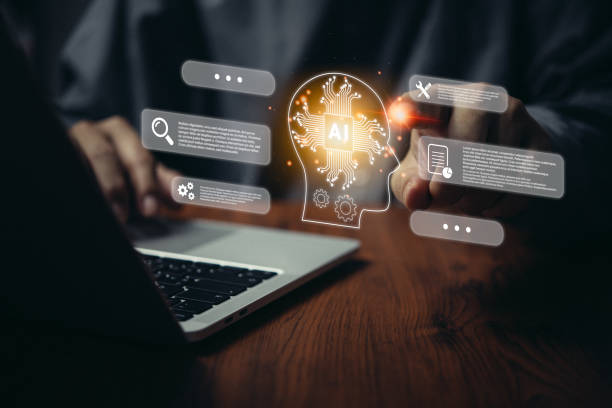- December 19, 2024
- Uncategorized
AI/ML in Social Media and Facebook: Transforming Business Through Intelligent Automation

Table of Contents
ToggleArtificial Intelligence (AI) and Machine Learning (ML) transforming businesses across various sectors. From improving operational efficiencies to enabling smarter decision-making, AI/ML technologies are driving a new era of intelligent automation. These technologies analyze vast amounts of data, predict trends, and automate processes, enhancing the customer experience, optimizing marketing efforts, revolutionizing finance, and advancing healthcare. In this post, we’ll explore how AI/ML is making a tangible impact in customer service, marketing, finance automation, and healthcare, and how businesses can leverage these innovations to stay competitive.
AI/ML in Customer Service
AI and ML have significantly raised the bar for providing seamless, personalized, and 24/7 support. One of the most widely recognized applications of AI in customer service is chatbots and virtual assistants. These tools can handle a range of tasks, from answering FAQs to solving complex customer issues, allowing businesses to offer real-time support without the need for human intervention. For instance, Amazon and Zappos have adopted AI chatbots that handle customer inquiries quickly and effectively, improving both speed and satisfaction.
To create customized chatbots that can handle diverse customer needs AI/ML development services, offering businesses more flexibility and control over their customer interactions.
Predictive analytics powered by machine learning is another game changer in customer service. By analyzing past customer interactions, AI can predict future needs, recommend relevant products, or send personalized offers at the right time, which leads to higher engagement and sales. For example, Netflix uses predictive analytics to recommend shows based on viewers’ preferences, creating a more engaging customer experience.
Moreover, AI is also automating repetitive tasks that consume valuable customer service agents’ time, such as ticketing and order tracking. With AI handling these tasks, employees can focus on more complex, higher-value interactions, improving productivity and satisfaction.
AI/ML in Marketing

AI/ML has radically transformed how businesses approach marketing, with its ability to process data and generate insights that were previously unimaginable. One of the most significant applications is in targeted advertising. AI algorithms analyze user behavior, purchase history, and demographic data to serve personalized advertisements to the most relevant audiences. This targeted approach not only enhances the efficiency of marketing campaigns but also improves return on investment (ROI).
Personalization at scale is another key benefit. AI systems can track a customer’s journey across different touchpoints—website visits, social media interactions, and even email responses—and deliver tailored content or recommendations. Brands like Amazon and Spotify excel at this, offering personalized product suggestions and playlists based on past behavior.
AI is also becoming a valuable tool for content creation and analysis. It can automate tasks such as generating copy for social media posts, blogs, or even ads. Additionally, ML algorithms can measure the effectiveness of marketing efforts, continuously refining strategies for optimal performance. For instance, Google Ads uses machine learning to adjust bidding strategies, ensuring that ads appear at the right time and in the right context to reach the right audience.
AI/ML in Finance
The financial services industry is experiencing a significant transformation thanks to AI and ML technologies. One of the most notable applications is in fraud detection and risk management. AI systems can analyze vast amounts of transaction data to identify unusual patterns or anomalies, helping banks and financial institutions detect fraudulent activities in real-time. JPMorgan Chase, for instance, uses AI to prevent fraud by continuously scanning transactions for signs of suspicious activity.
Another key use case is in algorithmic trading. By processing enormous datasets faster than human traders, AI can make rapid decisions on stock trades, allowing for more efficient and profitable trading strategies. The majority of stock market trading today is powered by AI algorithms that operate autonomously, based on market trends and data analysis.
Moreover, AI and ML enable financial institutions to offer personalized financial services to their customers. Robo-advisors powered by AI are helping individuals manage their investments by offering automated, data-driven advice. Square, a leading fintech company, uses AI to provide small businesses with tailored insights and recommendations on how to improve cash flow, sales, and operations.
AI/ML in Healthcare

AI and ML are also making a monumental impact in healthcare by improving patient care, enhancing diagnosis, and optimizing operational efficiencies. One of the most groundbreaking applications is in diagnosis and treatment recommendations. AI systems can process medical data such as lab results and patient histories to suggest potential diagnoses or treatment options. IBM Watson Health is an example of a platform that uses AI to analyze medical literature and patient data to assist doctors in making more informed decisions.
In addition, AI is increasingly used in predictive healthcare and patient monitoring. By analyzing patient data in real-time, AI can predict potential health risks, such as heart disease or diabetes, enabling proactive interventions. Wearable devices, such as smartwatches, use AI to monitor vital signs like heart rate and sleep patterns, alerting users or healthcare providers to any irregularities.
AI’s capabilities also extend to drug discovery and development. Traditionally, this process has been lengthy and expensive, but with AI, pharmaceutical companies can rapidly analyze vast datasets to identify promising compounds or predict clinical trial outcomes. DeepMind, a subsidiary of Google, has used AI to discover new potential drugs and accelerate the development process.
Conclusion
AI and ML are not just reshaping industries—they are revolutionizing how businesses operate and engage with customers. From streamlining customer service operations and driving personalized marketing to transforming financial strategies and advancing healthcare, the potential of AI and ML is vast. As these technologies continue to evolve, their impact will only grow, offering even more opportunities for innovation and efficiency. Businesses that embrace AI and ML today will be well-positioned to thrive in the future, staying ahead of competitors and delivering exceptional experiences to their customers.
Share it with your friends!
Explore
More
Ready to get started?
Harness the unmatched capabilities of ActionSprout to transform your Facebook strategy. Elevate engagement, captivate your audience, and achieve unparalleled results. Don’t wait – seize the opportunity.

